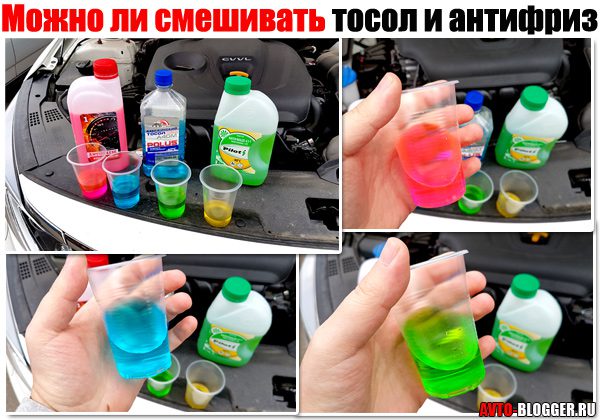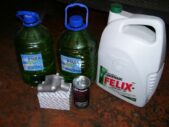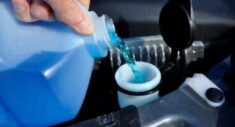
Is it possible to mix Antifreeze with antifreeze
Content
Almost every modern motorist is familiar with coolants, their scope and functionality. In this article, we will try to answer the questions that concern many, especially beginners, motorists - “Is it possible to mix different types of coolants, why do this and what consequences can this lead to?
Types of coolants
Car enthusiasts of the older generation, "brought up" by the Soviet car industry, are accustomed to calling all coolants "antifreeze". This is due to the fact that in those "distant" times "Tosol" was practically the only refrigerant available to a wide range of consumers. Meanwhile, "Tosol" is just the trade name of one of the representatives of the refrigerant family.

is it possible to mix antifreeze with antifreeze
Modern industry produces two types of coolants:
- "Saline". These antifreezes can be green or blue;
- "Acid". The color of the liquid is red.
Why mix "antifreeze" with other antifreezes?
By their composition, antifreezes are divided into ethylene and polypropylene glycol. The second type of refrigerant is more popular because ethylene antifreezes are toxic, and their use requires increased caution from motorists.
It is widely believed among motorists that mixing different types of coolants leads to the accumulation of more additives in the system, which, in turn, provide additional system protection against corrosion. Also, according to this theory, mixing different coolants slows down the process of decomposition of the materials themselves and, thereby, provides a longer period of effective operation of the refrigerants.
Both assumptions are quite controversial, if only because they are not supported by any facts. Most likely, this theory arose "after the fact" and played the role of an excuse for various force majeure cases when you have to top up the system with the antifreeze that you have managed to buy at the moment.

Antifreeze or antifreeze that can be poured
In the warm season, such a situation does not pose a great danger. In summer, you can pour plain water into the radiator. But with the onset of cold weather, it will be necessary to drain it, water, thoroughly rinse the system and fill in antifreeze. If this is not done, then the water in the system, at a negative temperature, will surely freeze, which can cause irreparable harm to the pipes and the expansion tank.
There is a likelihood of such an unpleasant situation occurring when various types of antifreeze are poured into the system. The main danger is that the basic characteristics of such a "mixed refrigerant" are very difficult.
So to mix or not?
In general, this question should be answered as follows - "Antifreeze can be mixed under the condition... ". We will talk about these "conditions" below.
The first thing a car enthusiast needs to know is that different refrigerants have different compositions. A common mistake is to classify antifreeze by color. Color plays a secondary role, or rather, it does not play any role. The chemical composition of the liquid is important.
Structure of antifreeze
- base (polypropylene glycol or ethylene glycol);
- distilled water;
- colorants;
- various additives.
As we have already found out, dyes do not have any effect on the physical characteristics of antifreeze, the same can be safely said about distilled water. The main thing when looking for an answer to the question - is it possible to mix "Tosol" with other antifreezes, is to analyze the compatibility of the additives contained in these materials.
Antifreeze manufacturers use various substances as additives, the physical and chemical characteristics of which can vary greatly. They also differ in their functional purpose.


The chemical composition of antifreeze and antifreeze
Modern antifreezes can and usually do contain additives that have good anti-corrosion properties. Such additives reliably protect the elements of the vehicle cooling system from various aggressive environments. This group of additives is very important in ethylene glycol based antifreezes.
Additives of the second group are designed to reduce the freezing point of antifreeze.
The third group of additives is a material with good "lubricating" characteristics.
When mixing "antifreeze" with other antifreezes, there is a possibility that additives with different chemical composition can react with each other, thereby adversely affecting the working parameters of the materials. In addition, the result of the mentioned chemical reactions can be the formation of various sedimentary elements that will clog the car's cooling system, which will inevitably lead to a decrease in its efficiency.
Repeating, we note that the analysis of all these factors is very important when mixing various antifreezes. In recent years, there has been a trend towards standardization and universalization of refrigerants. Made by different manufacturers, but according to the same standards, antifreezes can be mixed with each other without fear. So, for example, G11 and G12 antifreezes from different manufacturers, including domestic ones, perfectly interact with each other in the cooling systems of domestic and foreign cars.


Watch this video on YouTube
Questions and answers:
Can I add a little water to the antifreeze? If in summer, then it is possible, but only distilled. In winter, it is strictly forbidden to do this, because the water will freeze and damage the parts of the cooling system.
How to dilute antifreeze with water? If concentrated antifreeze is purchased, then the proportion with water depends on the region. If the car is operated in a region with a mild climate, then the proportion is 1 to 1.
How much water can you add to antifreeze? In an emergency, this is permissible, for example, if a leak appears while driving. But in winter, it is better to replace such a mixture with a full-fledged antifreeze or pour in a diluted antifreeze concentrate.


2 comment
great
Please tell me, I don't want to change the antifreeze in my COLT Plus yet, it's expensive. They say you can use what concentrate, if not a secret?
TurboRacing
The very fact that antifreeze freezes indicates that more water is poured into the cooling system than is needed. High-quality antifreeze should not freeze.
At the expense of adding a concentrate - the decision is not entirely correct, and besides, it is temporary. Antifreeze concentrate must be properly diluted before being poured into the cooling system. The instructions will usually tell you how to dilute with water to get your desired freezing point. By adding concentrate directly to the system, you will not be able to calculate this, which once again can lead to freezing.
And in terms of cost, the concentrate will cost even more than antifreeze.
It would be more correct to replace the antifreeze, otherwise the freezing of the coolant will continue during frosts.